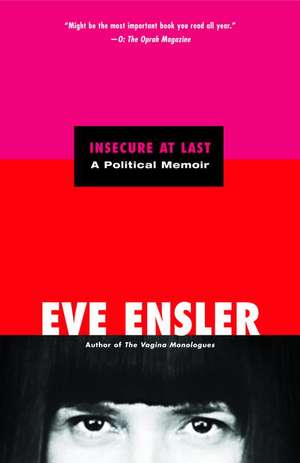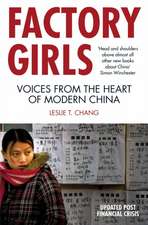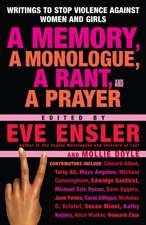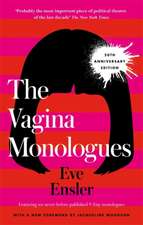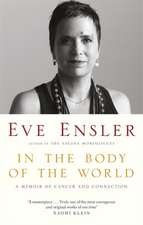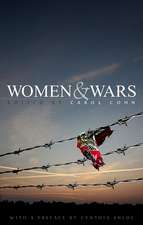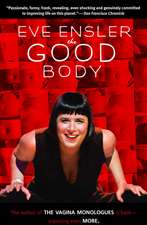Insecure at Last: A Political Memoir
Autor Eve Ensleren Limba Engleză Paperback – 30 noi 2007
When her stage play The Vagina Monologues became a runaway hit and an international sensation, Eve Ensler emerged as a powerful voice and champion for women everywhere. Now the brilliant playwright gives us her first major work written exclusively for the printed page. Insecure at Last is a timely and urgent look at our security-obsessed world, the drastic measures taken to keep us safe, and how we can truly experience freedom by letting go of the deceptive notion of vigilant “protection.”
Ensler draws on personal experiences and candid interviews with burka-clad women in Afghanistan; female prisoners in upstate New York; survivors at the Superdome after Katrina; and anti-war activist Cindy Sheehan–sharing unforgettable snapshots that chronicle a post-9/11 existence in which hyped obsession for safety and security has undermined our humanity. The us-versus-them mentality, Ensler explains, has closed our minds and hardened our compassionate hearts.
Provocative, illuminating, inspiring, and boldly envisioned, Insecure at Last challenges us to reconsider what it means to be free, to discover that our strength is not born out of that which protects us. Ensler offers us the opportunity to reevaluate our everyday lives, expose our vulnerability, and, in doing so, experience true freedom and fulfillment.
From the Hardcover edition.
Preț: 99.30 lei
Nou
Puncte Express: 149
Preț estimativ în valută:
19.00€ • 20.72$ • 16.02£
19.00€ • 20.72$ • 16.02£
Carte disponibilă
Livrare economică 03-17 aprilie
Preluare comenzi: 021 569.72.76
Specificații
ISBN-13: 9780812973662
ISBN-10: 0812973666
Pagini: 202
Dimensiuni: 133 x 203 x 14 mm
Greutate: 0.18 kg
Editura: Villard Books
ISBN-10: 0812973666
Pagini: 202
Dimensiuni: 133 x 203 x 14 mm
Greutate: 0.18 kg
Editura: Villard Books
Notă biografică
Eve Ensler is an internationally acclaimed playwright whose previous works for the stage include Floating Rhoda and the Glue Man, Lemonade, Necessary Targets, The Vagina Monologues, and The Good Body. Ensler is the founder and artistic director of V-Day (www.vday.org), the global movement to end violence against women and girls that was inspired by The Vagina Monologues. In eight years V-Day has raised more than $35 million for grassroots groups around the world. Eve Ensler lives in New York City.
From the Hardcover edition.
From the Hardcover edition.
Extras
I
DRAWN TO WHAT I FEARED THE MOST
THE FIRST MELTING
It is difficult to determine where any journey really begins. From a very young age, I was suspicious of the promise of security. Walt Disney cartoons and Father Knows Best gave me enormous anxiety. I sensed an underworld that was not being expressed, and the absence of it made me nervous. As a teenager I read two books over and over: Hiroshima and Death Be Not Proud. In the first, John Hersey documents individual accounts of those who survived the first nuclear attack. I remember melting flesh, bookcases crushing an older Japanese man, radiation sickness, hair falling out. In the other book, John Gunther’s son gradually and nobly dies of a brain tumor. I do not know which I feared more, nuclear annihilation or a massive tumor in my brain.
I remember when I became afraid of the dark. It was after I watched the movie The Invisible Man on television. There was something about Claude Rains unwrapping his bandages and revealing that underneath there was nothing, he was nothing. I vomited the whole night. I still feel nauseous thinking about it. The idea of becoming nothing, that we were made of nothing, the dissolution of self, of ego, was then my greatest fear. It was my introduction to death.
The possibility of tumors, disappearance, annihilation, circled my childhood, but it wasn’t until I traveled to a war zone in my early thirties that the abstraction of insecurity became a reality. In spite of even my very difficult childhood, I still lived in a comfortable environment. I had a cozy house on a white middle-class street in the USA. There were no air raids. No curfews. There were no bombs dropping around me. There was no one dragging my mother or sister out to be murdered or raped.
Sometime in 1993 I was walking down a street in Manhattan when I was seized by a photograph on the cover of Newsday—six young Bosnian girls who had just been returned from a rape. A rape camp. A place where soldiers held kidnapped women to serve and pleasure them. A rape camp in 1993. It seemed utterly surreal and impossible. Yet the faces of the girls who had survived indicated the seriousness and reality of the situation. There was something about the anger in their faces, and the shock. There was something about the disassociation and the loss. These girls entered me. Or perhaps they already lived inside me. I knew I had to go and be with them. I didn’t really know how or why. I knew I had to go and hear their stories. I had to know the details of what happened to them. I had to be close, to touch them, hear them, smell them, know them.
“They took my sixty-year-old mother and my sixty-eight-year-old father outside. These Chetniks, these boy soldiers who grew up with us, went to primary school with us. They were our neighbors, our close friends. They took my father first and made him stand in the center of our lawn. They were holding guns to his head. Then they casually began to throw stones, big stones, at him, pelting him in his head, his neck, his knees, his groin, as he stood helpless and very confused before us—before me, my mother, our other relatives. He was bruised and bleeding and exposed and they wouldn’t stop.”
I was sitting in a metal chair in a circle of women, all smoking and drinking thick black coffee from tiny cups, in a makeshift doctor’s office in a refugee camp out- side Zagreb, Croatia. I was listening to a thirty-year-old woman “doctress” (as my translator called her) describe her recent nightmare experiences in Bosnia. It was the summer of 1994. I had gone to Croatia for two months to interview Bosnian refugees.
“Then they took my mother and poured gasoline around her feet. For three hours they lit matches and held them as close to the gasoline as they possibly could. My mother turned pure white. It was very cold outside. There was nothing we could do. Three hours they tortured her like this. Then she started screaming. She was so courageous, my mother. She ripped her shirt open and screamed, ‘Go ahead, you Chetniks. Kill me. Kill me. I am not afraid of you, not afraid to die. I am not afraid. Kill me. Kill me.’ ”
The group of refugees around me seemed to have stopped breathing or moving as they listened to this story. Except for their eyes, which filled up or fluttered reflexively from pain.
I heard myself asking reporter-like questions in a strange reporter-like voice, a voice that implied I had seen all this, it wasn’t new, just another war story. I asked questions like “How do you explain your neighbors turning against you like that?” “Did you ever worry about being a Muslim before the war?” I asked these questions from behind this newly developed persona as if it were a secret shield, a point of logic, a place of safety. I was suddenly a “professional.”
“After I had finally escaped and gotten here, I heard our village was safe again. The U.N. raided the concentration camp and my father was released. I began to get a glimmer of hope. Then the real horror happened. The Chetniks invaded my village. They were wild, insane. They butchered every member of my family with machetes. My mother and father were found, their limbs spread out all over our lawn.”
I listened to the doctress’s words and I felt the loss of gravity. Something caved in. Logic. Safety. Order. Ground. I didn’t want to cry. Professionals didn’t cry. Professionals asked questions and transcribed answers. Playwrights see people as characters. She is a doctor character. She is a strong resilient traumatized woman character. I choked back my tears. I bore down on the parts of my body where shakes were leaking out.
During my first ten days in Zagreb, I slept on a couch in the Center for Women War Victims. This was a remarkable place. Originally it had been created to serve Croatian, Muslim, Serbian women refugees who’d been raped in the war. Over three years it had evolved to serve more than five hundred refugee women who had been not only raped but shattered and made homeless by the war.
Most of the women who worked there were refu- gees themselves. They ran support groups, provided emergency aid: food, toiletries, medication, toys, et cetera. They helped women find employment, affordable medical treatment, schools for their children.
In those first ten days, I spent between five and eight hours a day interviewing women refugees in support groups in city centers, desolate refugee camps, and local cafés. I interviewed mothers, widows, grandmothers, lawyers, doctors, professors, farmers, teenagers. I heard stories of atrocities and cruelty. I met a country of women dressed in black: black silk blouses, black cotton skirts, black lycra T-shirts. The courage, community, kindness, and miraculous sense of forgiveness I witnessed on the part of these war victims threw me into moral chaos and deep questioning.
In all these interviews either I was filled with an overwhelming desire to rescue the women or I tried to maintain this “professional playwright” position. I was observing these women as characters, hearing their stories as potential plays, measuring the drama in terms of beats and momentum. This approach made me seem cold, impervious, superior. Both postures were attempts at maintaining a distance and, more important, maintaining my security.
Thousands of journalists had already passed through these women’s lives. They had visited for a day, a week at most. The women felt invaded, robbed, ripped off. The reporters were interested only in the most sensationalistic aspects of these women’s lives—the gang rapes, the rape camps. One journalist had actually sent a fax (these were still the days of faxes) saying, “Get me one raped woman, preferably gang raped, preferably English speaking.” The women had taped the fax to the bulletin board as evidence and a warning.
It was a great honor and privilege that the refugee workers had brought me into the camps, allowed me to be in their most intimate groups. They had even, at times, focused their groups around my being there.
I felt I had not honored my end of the contract. I realized that if I wasn’t “saving” these women—offering solutions—or transforming them into literary substance, I had no idea what to do. My ways of relating were hierarchical, one-sided, based on me perceiving myself as a healer, a problem solver. All of this was based on a desperate and hidden need to control—to protect myself from too much loss, chaos, pain, cruelty, and insanity. My need to analyze, interpret, even create art out of these war atrocities stemmed from my real inability to be with people, to be with their suffering, to listen, to feel, to be lost in the mess.
On the tenth day in Zagreb, a woman who worked at the center generously offered me her apartment for the weekend. I was actually terrified. It would be the first time I’d be alone since my arrival in Croatia, the first time I’d be able to digest the stories and atrocities.
In all my years as an activist—working in desolate shelters for homeless women, tying myself to fences to prevent nuclear war, sleeping in city parks in women’s peace camps with rain and rats, camping on a windy Nevada nuclear-test site in radioactive dust—I had never felt so lonely. I called the States. I reached answering machines in place of loved ones. I paced the little apartment. I tried to read but was unable to concentrate. I lay down on the bed.
My heart was breaking from the inside like an organism giving birth to itself, to the stories of itself: the lit cigarettes almost put through the soldier’s wife’s eyeballs so “she could always see clearly,” the decapitated heads of her old parents, the fifteen-year-old girl raped by her soldier husband and his soldier friends in the car, the hand grenades he stored in their house, the pistol they put in her three-month-old baby’s little hand as a game, the food they didn’t serve the Muslim girl’s mother, who had decided to give birth to the baby of the Serb who raped her, the Canadian uncle who attempted to molest his fourteen-year-old niece who had fled to him from Sarajevo for safety, the dirty stained clothes that arrived in the bandaged boxes of humanitarian aid that the refugee women were supposed to be grateful for, the broken toys, the generic ammonia-smelling body soap, the husband and son she last saw two years ago digging the graves of friends and relatives in their village under orders from Serbs, the waiting, her twisted waiting face, the big fang-exposed German shepherd that the Chetniks held right near the little babies’ faces in her living room as he forced the Muslim doctress to suck his dirty dick while her mother was forced to prepare his dinner, the window the twelve-year-old girl jumped out of eight stories high because she couldn’t comprehend how her best friends from high school, her friends from the disco, had turned so quickly against them with knives, guns, fire, and insults, the cows they burned with bombs and left starving, the family cows.
Tears broke out of my eyes like glass cutting flesh, breaking me, breaking through my craving for definition, authority, fame, somebodyhood, breaking all that into little tiny pieces that became nothing I could identify, nothing that resembled me or the matter of me. Me was lost. There was just melting. Bandages unwrapping. Me becoming invisible.
It wasn’t the cruelty that broke my heart. Cruelty is boring, generic. What hurt in my chest was witnessing the unsuspecting nature of the women, how unprepared they were, how shocked and disbelieving. What hurt was feeling love for these lost women who sat around a wobbly refugee table. The woman who clung to her one plastic bag or made sweet pastry in what was now her kitchen, bedroom, living room, bathroom, all in one. Made pastry for me, a stranger. The woman who kept smiling with missing teeth, who gave strength to the woman next to her, who smoked cigarettes and smoothed her skirt or apologized for her messy hair. What hurt was that their life was over. What hurt was that they kept going.
After this experience, my journey was transformed. I began to re-perceive the nature of my interviews, the nature of interviews in general. I began to see these encounters as sacred social contracts. I, the interviewer, could not simply take stories, events, feelings from my subjects. I could not sit there icy and objective, absorbing. I had to be present. I had to be in dialogue. I had to be insecure. I could no longer protect myself, stand outside the stories I was hearing. I had to allow myself to feel the sadness, torture, fear, loss, and particularly the courage and strength of the women I was meeting. War was not natural. I would never be comfortable with atrocity and cruelty. I found myself crying often during the interviews. I felt little, helpless. I experienced aspects of myself—defenses, identities, approaches—dying away.
I changed continents. I changed clothes. I went from a tiny village on the Adriatic where I visited Croatian refugees to the hot dusty Asian landscape of Pakistan, where I was covered in purple Indian cotton, the traditional salwar kameez. I was there to visit a group of Bosnian refugees who were living in dreadful circumstances. This particular group of Muslim men and women had previously lived in a hostel in Croatia. There they had been offered the choice of being moved either to a dangerous and overcrowded Muslim refugee camp close to the Serbian border or to Pakistan, where, they were promised, they could begin a new life of “bungalows, swimming pools, and jobs.”
So about five hundred of them had come to Rawal- pindi, Pakistan. The reality they found could hardly have been further from what had been promised. The temperature was 120 degrees Fahrenheit and higher during monsoon rainstorms. Initially they had to live thirteen people to a room. Malaria was rampant, as were diseases from the water and food.
The culture was radically different from their own. The majority of these Bosnians were Muslim, but they were more modern and Westernized than they were religious. Suddenly they were in a fundamentalist Islamic country.
Because their Pakistani hosts were offering them even more than they offered most of their own citizens, more than most countries had offered them anywhere in the world, the Bosnians felt guilty not feeling more grateful. They spent their days waiting—waiting for the weather to cool off, waiting to get out of Pakistan (those that were waiting for entry into America had been waiting the longest), waiting for news of their hometown, waiting for the nightmares to pass, waiting.
Each day I would sit with these refugees for many hours in a saunalike room; we would form a huge circle and the people would tell their stories. Everyone was sick in some way, everyone deeply traumatized from the horrific events they had suffered in the war. And yet, there was great humor, generosity, and community.
During my last days there, I became very ill with some kind of flu. The Bosnians overwhelmed me with kindness, offering me homemade remedies and soups. There was this particular little bottle of nose drops that had clearly passed through the entire community. When they offered it to me, I felt I was undergoing a rite of passage. Now I was infected with refugee illness, with a tiny bit of their suffering.
I had a fever and my nose was running. I felt all my defenses and protection had been washed away, and that didn’t seem to matter anymore. I sat on a mattress in a 120-degree room while an older woman with shaking hands was telling her story.
“They came, a group of them, into our neighborhood. They took my first neighbor, my best friend, into the street. There were fifteen soldiers. There in front of her husband and children and neighbors they raped her one after the other until all fifteen had raped her. They did this in front of all of us. They did it to teach us a lesson.
“Please, tell people in America what happened here. We want them to know what happened here. We do not understand how they have abandoned us.”
I asked her then, “Tell me, were they successful? Did the Serbs make the Muslims feel bad about being Muslim? Did they take their dignity and self-esteem?”
“No,” she said. “No. Not. They raped many women. Twenty-two thousand women. They did not take our dignity though. They did not touch it. The women who were raped did not lose their dignity. What they lost was their minds.”
I looked around and I realized a lot of us were crying, sweating, melting. In that moment I loved these Bosnians completely. I loved their stove-made bread and their meat-filled peppers that they cooked for us each day in the heat. I loved that they had survived and their hearts were intact and their kindness was so deeply present even now after everything. We got lost in each other’s arms, we grieved their losses. We raged at the cruelty they had suffered. And in the center of this weeping, in the center of this sweating and running nose, I found an odd, perfect strength. It is the strength that comes from surrender, from dissolving.
I returned to the States on a plane that nearly crashed over the Atlantic. In midflight it simply dropped thousands of feet out of the sky. Passengers went flying, luggage was released from the overhead compartments, and objects were hurling through space. Parents were rocking their children. Many were praying and chanting, some were crying, others were perfectly still. The woman next to me took my hand and said she needed to tell someone goodbye. We were walking through our final moment. Then somehow the falling stopped, the plane got caught on some ledge of air.
Flight attendants had brain concussions. Passengers had spiritual experiences they felt compelled to share with strangers.
Eventually I came back to earth—well, the plane landed. In fact, something crucial inside me had changed. Sure footing was gone. I had seen how easily neighbors and supposed friends could turn against their friends and neighbors. I had seen how in a split second a comfortable life could become a nightmare. I had seen how quickly fascist thugs could rise to power by manipulating the people with tactics of racism and terror.
Suddenly nothing was secure. Nothing was dependable. Nothing was what it appeared to be. My life in the U.S. seemed bizarre and irrelevant for months afterward. Most of me remained in Croatia and Pakistan with those women. The memory of their stories and faces and beings made my falsely constructed and misdirected life impossible. I was completely disoriented, unwilling and unable to participate in business as usual. The deconstruction of the notion of security threw me into the center of sadness, rage, and a torrent of other emotions. Oddly though, I was not depressed. Lost, searching, emotional, but not depressed. It had been my denial itself, not the painful things I had been denying, that had been depressing and isolating me. It had been my clinging to what I instinctively knew were lies and illusions that had reduced and imprisoned me.
From the Hardcover edition.
DRAWN TO WHAT I FEARED THE MOST
THE FIRST MELTING
It is difficult to determine where any journey really begins. From a very young age, I was suspicious of the promise of security. Walt Disney cartoons and Father Knows Best gave me enormous anxiety. I sensed an underworld that was not being expressed, and the absence of it made me nervous. As a teenager I read two books over and over: Hiroshima and Death Be Not Proud. In the first, John Hersey documents individual accounts of those who survived the first nuclear attack. I remember melting flesh, bookcases crushing an older Japanese man, radiation sickness, hair falling out. In the other book, John Gunther’s son gradually and nobly dies of a brain tumor. I do not know which I feared more, nuclear annihilation or a massive tumor in my brain.
I remember when I became afraid of the dark. It was after I watched the movie The Invisible Man on television. There was something about Claude Rains unwrapping his bandages and revealing that underneath there was nothing, he was nothing. I vomited the whole night. I still feel nauseous thinking about it. The idea of becoming nothing, that we were made of nothing, the dissolution of self, of ego, was then my greatest fear. It was my introduction to death.
The possibility of tumors, disappearance, annihilation, circled my childhood, but it wasn’t until I traveled to a war zone in my early thirties that the abstraction of insecurity became a reality. In spite of even my very difficult childhood, I still lived in a comfortable environment. I had a cozy house on a white middle-class street in the USA. There were no air raids. No curfews. There were no bombs dropping around me. There was no one dragging my mother or sister out to be murdered or raped.
Sometime in 1993 I was walking down a street in Manhattan when I was seized by a photograph on the cover of Newsday—six young Bosnian girls who had just been returned from a rape. A rape camp. A place where soldiers held kidnapped women to serve and pleasure them. A rape camp in 1993. It seemed utterly surreal and impossible. Yet the faces of the girls who had survived indicated the seriousness and reality of the situation. There was something about the anger in their faces, and the shock. There was something about the disassociation and the loss. These girls entered me. Or perhaps they already lived inside me. I knew I had to go and be with them. I didn’t really know how or why. I knew I had to go and hear their stories. I had to know the details of what happened to them. I had to be close, to touch them, hear them, smell them, know them.
“They took my sixty-year-old mother and my sixty-eight-year-old father outside. These Chetniks, these boy soldiers who grew up with us, went to primary school with us. They were our neighbors, our close friends. They took my father first and made him stand in the center of our lawn. They were holding guns to his head. Then they casually began to throw stones, big stones, at him, pelting him in his head, his neck, his knees, his groin, as he stood helpless and very confused before us—before me, my mother, our other relatives. He was bruised and bleeding and exposed and they wouldn’t stop.”
I was sitting in a metal chair in a circle of women, all smoking and drinking thick black coffee from tiny cups, in a makeshift doctor’s office in a refugee camp out- side Zagreb, Croatia. I was listening to a thirty-year-old woman “doctress” (as my translator called her) describe her recent nightmare experiences in Bosnia. It was the summer of 1994. I had gone to Croatia for two months to interview Bosnian refugees.
“Then they took my mother and poured gasoline around her feet. For three hours they lit matches and held them as close to the gasoline as they possibly could. My mother turned pure white. It was very cold outside. There was nothing we could do. Three hours they tortured her like this. Then she started screaming. She was so courageous, my mother. She ripped her shirt open and screamed, ‘Go ahead, you Chetniks. Kill me. Kill me. I am not afraid of you, not afraid to die. I am not afraid. Kill me. Kill me.’ ”
The group of refugees around me seemed to have stopped breathing or moving as they listened to this story. Except for their eyes, which filled up or fluttered reflexively from pain.
I heard myself asking reporter-like questions in a strange reporter-like voice, a voice that implied I had seen all this, it wasn’t new, just another war story. I asked questions like “How do you explain your neighbors turning against you like that?” “Did you ever worry about being a Muslim before the war?” I asked these questions from behind this newly developed persona as if it were a secret shield, a point of logic, a place of safety. I was suddenly a “professional.”
“After I had finally escaped and gotten here, I heard our village was safe again. The U.N. raided the concentration camp and my father was released. I began to get a glimmer of hope. Then the real horror happened. The Chetniks invaded my village. They were wild, insane. They butchered every member of my family with machetes. My mother and father were found, their limbs spread out all over our lawn.”
I listened to the doctress’s words and I felt the loss of gravity. Something caved in. Logic. Safety. Order. Ground. I didn’t want to cry. Professionals didn’t cry. Professionals asked questions and transcribed answers. Playwrights see people as characters. She is a doctor character. She is a strong resilient traumatized woman character. I choked back my tears. I bore down on the parts of my body where shakes were leaking out.
During my first ten days in Zagreb, I slept on a couch in the Center for Women War Victims. This was a remarkable place. Originally it had been created to serve Croatian, Muslim, Serbian women refugees who’d been raped in the war. Over three years it had evolved to serve more than five hundred refugee women who had been not only raped but shattered and made homeless by the war.
Most of the women who worked there were refu- gees themselves. They ran support groups, provided emergency aid: food, toiletries, medication, toys, et cetera. They helped women find employment, affordable medical treatment, schools for their children.
In those first ten days, I spent between five and eight hours a day interviewing women refugees in support groups in city centers, desolate refugee camps, and local cafés. I interviewed mothers, widows, grandmothers, lawyers, doctors, professors, farmers, teenagers. I heard stories of atrocities and cruelty. I met a country of women dressed in black: black silk blouses, black cotton skirts, black lycra T-shirts. The courage, community, kindness, and miraculous sense of forgiveness I witnessed on the part of these war victims threw me into moral chaos and deep questioning.
In all these interviews either I was filled with an overwhelming desire to rescue the women or I tried to maintain this “professional playwright” position. I was observing these women as characters, hearing their stories as potential plays, measuring the drama in terms of beats and momentum. This approach made me seem cold, impervious, superior. Both postures were attempts at maintaining a distance and, more important, maintaining my security.
Thousands of journalists had already passed through these women’s lives. They had visited for a day, a week at most. The women felt invaded, robbed, ripped off. The reporters were interested only in the most sensationalistic aspects of these women’s lives—the gang rapes, the rape camps. One journalist had actually sent a fax (these were still the days of faxes) saying, “Get me one raped woman, preferably gang raped, preferably English speaking.” The women had taped the fax to the bulletin board as evidence and a warning.
It was a great honor and privilege that the refugee workers had brought me into the camps, allowed me to be in their most intimate groups. They had even, at times, focused their groups around my being there.
I felt I had not honored my end of the contract. I realized that if I wasn’t “saving” these women—offering solutions—or transforming them into literary substance, I had no idea what to do. My ways of relating were hierarchical, one-sided, based on me perceiving myself as a healer, a problem solver. All of this was based on a desperate and hidden need to control—to protect myself from too much loss, chaos, pain, cruelty, and insanity. My need to analyze, interpret, even create art out of these war atrocities stemmed from my real inability to be with people, to be with their suffering, to listen, to feel, to be lost in the mess.
On the tenth day in Zagreb, a woman who worked at the center generously offered me her apartment for the weekend. I was actually terrified. It would be the first time I’d be alone since my arrival in Croatia, the first time I’d be able to digest the stories and atrocities.
In all my years as an activist—working in desolate shelters for homeless women, tying myself to fences to prevent nuclear war, sleeping in city parks in women’s peace camps with rain and rats, camping on a windy Nevada nuclear-test site in radioactive dust—I had never felt so lonely. I called the States. I reached answering machines in place of loved ones. I paced the little apartment. I tried to read but was unable to concentrate. I lay down on the bed.
My heart was breaking from the inside like an organism giving birth to itself, to the stories of itself: the lit cigarettes almost put through the soldier’s wife’s eyeballs so “she could always see clearly,” the decapitated heads of her old parents, the fifteen-year-old girl raped by her soldier husband and his soldier friends in the car, the hand grenades he stored in their house, the pistol they put in her three-month-old baby’s little hand as a game, the food they didn’t serve the Muslim girl’s mother, who had decided to give birth to the baby of the Serb who raped her, the Canadian uncle who attempted to molest his fourteen-year-old niece who had fled to him from Sarajevo for safety, the dirty stained clothes that arrived in the bandaged boxes of humanitarian aid that the refugee women were supposed to be grateful for, the broken toys, the generic ammonia-smelling body soap, the husband and son she last saw two years ago digging the graves of friends and relatives in their village under orders from Serbs, the waiting, her twisted waiting face, the big fang-exposed German shepherd that the Chetniks held right near the little babies’ faces in her living room as he forced the Muslim doctress to suck his dirty dick while her mother was forced to prepare his dinner, the window the twelve-year-old girl jumped out of eight stories high because she couldn’t comprehend how her best friends from high school, her friends from the disco, had turned so quickly against them with knives, guns, fire, and insults, the cows they burned with bombs and left starving, the family cows.
Tears broke out of my eyes like glass cutting flesh, breaking me, breaking through my craving for definition, authority, fame, somebodyhood, breaking all that into little tiny pieces that became nothing I could identify, nothing that resembled me or the matter of me. Me was lost. There was just melting. Bandages unwrapping. Me becoming invisible.
It wasn’t the cruelty that broke my heart. Cruelty is boring, generic. What hurt in my chest was witnessing the unsuspecting nature of the women, how unprepared they were, how shocked and disbelieving. What hurt was feeling love for these lost women who sat around a wobbly refugee table. The woman who clung to her one plastic bag or made sweet pastry in what was now her kitchen, bedroom, living room, bathroom, all in one. Made pastry for me, a stranger. The woman who kept smiling with missing teeth, who gave strength to the woman next to her, who smoked cigarettes and smoothed her skirt or apologized for her messy hair. What hurt was that their life was over. What hurt was that they kept going.
After this experience, my journey was transformed. I began to re-perceive the nature of my interviews, the nature of interviews in general. I began to see these encounters as sacred social contracts. I, the interviewer, could not simply take stories, events, feelings from my subjects. I could not sit there icy and objective, absorbing. I had to be present. I had to be in dialogue. I had to be insecure. I could no longer protect myself, stand outside the stories I was hearing. I had to allow myself to feel the sadness, torture, fear, loss, and particularly the courage and strength of the women I was meeting. War was not natural. I would never be comfortable with atrocity and cruelty. I found myself crying often during the interviews. I felt little, helpless. I experienced aspects of myself—defenses, identities, approaches—dying away.
I changed continents. I changed clothes. I went from a tiny village on the Adriatic where I visited Croatian refugees to the hot dusty Asian landscape of Pakistan, where I was covered in purple Indian cotton, the traditional salwar kameez. I was there to visit a group of Bosnian refugees who were living in dreadful circumstances. This particular group of Muslim men and women had previously lived in a hostel in Croatia. There they had been offered the choice of being moved either to a dangerous and overcrowded Muslim refugee camp close to the Serbian border or to Pakistan, where, they were promised, they could begin a new life of “bungalows, swimming pools, and jobs.”
So about five hundred of them had come to Rawal- pindi, Pakistan. The reality they found could hardly have been further from what had been promised. The temperature was 120 degrees Fahrenheit and higher during monsoon rainstorms. Initially they had to live thirteen people to a room. Malaria was rampant, as were diseases from the water and food.
The culture was radically different from their own. The majority of these Bosnians were Muslim, but they were more modern and Westernized than they were religious. Suddenly they were in a fundamentalist Islamic country.
Because their Pakistani hosts were offering them even more than they offered most of their own citizens, more than most countries had offered them anywhere in the world, the Bosnians felt guilty not feeling more grateful. They spent their days waiting—waiting for the weather to cool off, waiting to get out of Pakistan (those that were waiting for entry into America had been waiting the longest), waiting for news of their hometown, waiting for the nightmares to pass, waiting.
Each day I would sit with these refugees for many hours in a saunalike room; we would form a huge circle and the people would tell their stories. Everyone was sick in some way, everyone deeply traumatized from the horrific events they had suffered in the war. And yet, there was great humor, generosity, and community.
During my last days there, I became very ill with some kind of flu. The Bosnians overwhelmed me with kindness, offering me homemade remedies and soups. There was this particular little bottle of nose drops that had clearly passed through the entire community. When they offered it to me, I felt I was undergoing a rite of passage. Now I was infected with refugee illness, with a tiny bit of their suffering.
I had a fever and my nose was running. I felt all my defenses and protection had been washed away, and that didn’t seem to matter anymore. I sat on a mattress in a 120-degree room while an older woman with shaking hands was telling her story.
“They came, a group of them, into our neighborhood. They took my first neighbor, my best friend, into the street. There were fifteen soldiers. There in front of her husband and children and neighbors they raped her one after the other until all fifteen had raped her. They did this in front of all of us. They did it to teach us a lesson.
“Please, tell people in America what happened here. We want them to know what happened here. We do not understand how they have abandoned us.”
I asked her then, “Tell me, were they successful? Did the Serbs make the Muslims feel bad about being Muslim? Did they take their dignity and self-esteem?”
“No,” she said. “No. Not. They raped many women. Twenty-two thousand women. They did not take our dignity though. They did not touch it. The women who were raped did not lose their dignity. What they lost was their minds.”
I looked around and I realized a lot of us were crying, sweating, melting. In that moment I loved these Bosnians completely. I loved their stove-made bread and their meat-filled peppers that they cooked for us each day in the heat. I loved that they had survived and their hearts were intact and their kindness was so deeply present even now after everything. We got lost in each other’s arms, we grieved their losses. We raged at the cruelty they had suffered. And in the center of this weeping, in the center of this sweating and running nose, I found an odd, perfect strength. It is the strength that comes from surrender, from dissolving.
I returned to the States on a plane that nearly crashed over the Atlantic. In midflight it simply dropped thousands of feet out of the sky. Passengers went flying, luggage was released from the overhead compartments, and objects were hurling through space. Parents were rocking their children. Many were praying and chanting, some were crying, others were perfectly still. The woman next to me took my hand and said she needed to tell someone goodbye. We were walking through our final moment. Then somehow the falling stopped, the plane got caught on some ledge of air.
Flight attendants had brain concussions. Passengers had spiritual experiences they felt compelled to share with strangers.
Eventually I came back to earth—well, the plane landed. In fact, something crucial inside me had changed. Sure footing was gone. I had seen how easily neighbors and supposed friends could turn against their friends and neighbors. I had seen how in a split second a comfortable life could become a nightmare. I had seen how quickly fascist thugs could rise to power by manipulating the people with tactics of racism and terror.
Suddenly nothing was secure. Nothing was dependable. Nothing was what it appeared to be. My life in the U.S. seemed bizarre and irrelevant for months afterward. Most of me remained in Croatia and Pakistan with those women. The memory of their stories and faces and beings made my falsely constructed and misdirected life impossible. I was completely disoriented, unwilling and unable to participate in business as usual. The deconstruction of the notion of security threw me into the center of sadness, rage, and a torrent of other emotions. Oddly though, I was not depressed. Lost, searching, emotional, but not depressed. It had been my denial itself, not the painful things I had been denying, that had been depressing and isolating me. It had been my clinging to what I instinctively knew were lies and illusions that had reduced and imprisoned me.
From the Hardcover edition.
